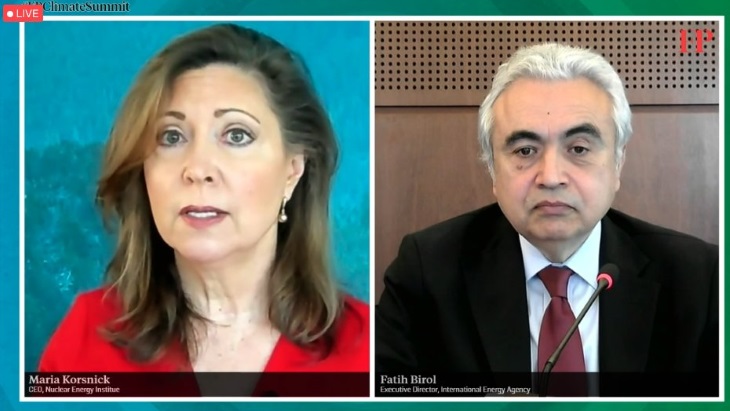Speaking in an interview with Maria Korsnick, president and CEO of the US Nuclear Energy Institute, Birol said: "There is the perception that energy is creating problems for climate change, but energy is a good thing. It makes life more comfortable, more productive. The problem is emissions. We should use energy in a clean way that will make our lives better and more productive."
Birol referred to his message at the Leaders Summit on Climate last week that countries need to match their pledges to reduce global warming with "real-world" actions. He reminded delegates at yesterday's conference that, to support stronger government action, the IEA will on 18 May publish the first comprehensive roadmap for the global energy sector to reach net-zero emissions by 2050. Requested by the COP26 Presidency, the roadmap will set out a pathway for what is needed from governments, companies, investors and citizens to put global emissions on a path in line with a temperature rise of 1.5 degrees Celsius.
Governments around the world may have made commitments to net zero, but they need to decide which combination of clean technologies will help them achieve this, Birol said.
"At the IEA we believe every government has to make its own choice, but in my view we do not have the luxury to exclude any clean energy technologies if we are serious about addressing climate change. The next 10 years especially are critical," he said. "We have to make the most of the existing proven clean energy technologies, but this alone is not enough to meet the climate targets."
IEA's research shows that just under half of the emission reductions will need to come from technologies that are not yet available, including hydrogen, storage and carbon capture.
"What existing proven technologies do we have in hand today to reduce emissions? One, renewables - solar, wind, hydropower, geothermal, bioenergy - these are in most cases technically viable and they will be the cornerstone in our fight against climate change. The second one is energy efficiency, using energy in a much more efficient way. Third is electric cars, which are seeing, slowly but surely, a strong increase. And, in my view, nuclear power, which, especially in many advanced economies, provides a significant amount of electricity generation."
He added: "We need to make the most of the existing technologies over the next 10 years, but at the same time push the button for innovation for the next clean energy technologies and nuclear is part of that."
No technology is "just perfect", he said, and each one has challenges, be they the cost of new nuclear projects or the intermittency of renewables. This means a systemic approach is needed, whereby a "configuration of the clean energies reduces emissions in a secure energy system".
"We should not forget energy security," he said. "Climate change is the most important challenge of the day, but energy security needs to be paid attention. A combination of renewable technologies, with battery storage, but also in the countries where it is accepted nuclear power could be a good combination."
Korsnick asked him "how to balance the cost conversation with the value conversation" when assessing the merits of a technology.
"The cost issue is not only one for nuclear but for all clean energy sources," he said, "but the contribution they make to addressing climate change and securing the energy system needs to be valued." This means remunerating that contribution via incentives, such as carbon pricing.
"Climate change is such a critical issue and you have to look at the entire system. Such a Herculean task cannot be left to the market alone. There is a need for government," he said. "If you look at cost alone, this may not reflect in some of the technologies the contribution they make to climate change and energy security. There is a need for regulation, for government support, for those clean energy technologies that are making this type of contribution."
Beyond electricity
Korsnick asked about the role of energy "beyond electricity" and towards industrial process heat and transport.
Birol said: "Iron, steel, cement, aluminium, for those sectors where you need high temperature process heat, today's game is fossil fuels, and coal is a major issue."
Referring to the IEA's forecast that global emissions in 2021 will be the second largest increase in history, he said coal is the main culprit.
"Some people think it will be the clean electricity transition. No. It will be a clean energy transition since emissions coming from the power sector, or iron and steel, or aviation, they are still emissions. So we need to have a systemic approach to all of them."
He added: "The magnitude of the challenge and the little time there is to address it, means that the governments of today are in the driving seat to address climate change. We are seeing companies and industries coming one after another with commitments. That is all very good, but the rule of the game for them is to make money. So governments need to provide incentives and frameworks so that the industries' decisions are driven by financial incentives for clean ones and disincentives for dirty ones."
As an example, he said that, "nice speeches" by policymakers about electric cars mattered less than policies that create price signals for citizens to purchase them.
On the emerging role of hydrogen, Birol said he has "rarely seen any technology that is so much loved by governments around the world". That sentiment, however, needs to be matched with a clear strategy on how they will develop the infrastructure required to produce hydrogen in their countries, and the financial incentives for this.
"We have high expectations from hydrogen but, once again, in the absence of government strategy, planning and incentives, with only rhetoric, it will not go through."





_53504.jpg)

_13505.jpg)
_87975.jpg)






